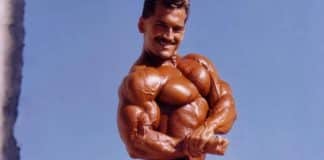Tony Blauer shares his self defense training philosophy – how learning to control your psychological fear will transform your ability to fight and succeed.
Tony Blauer is a mixed martial artist and a self defense trainer who has been teaching since 1979. He is considered a pioneer in self defense circles – largely because of his philosophy and psychology behind training and teaching self defense. This philosophy has allowed him to influence three decades of self defense, martial arts, combat sports, military and law enforcement individuals and communities. Presented by Generation Iron and Barbend – on this week’s episode of The Mike O’Hearn Show, Tony Blauer explains his F.U.C.K. fear system and how it can transform not only your combat abilities but your success in life.
Some of you may not know Tony Blauer by name – but his teaching style and philosophy has been influencing many in the worlds of stunt, combat, and mixed martial arts. He has spent over 40 years studying danger, violence, and fear to create and pioneer an innovative system for physical combat and self defense.
As a lover of Bruce Lee, Mike O’Hearn invited Tony Blauer onto the podcast to talk about Blauer’s origins in discovering mixed martial arts and self defense. What unfolded, as is often with martial arts, was a deeper discussion about the psychology behind combat, specifically fear, and how to psychologically master fear in order to defend not only against outside threats – but the mental threats within yourself. Let’s jump into it.
F.U.C.K. Fear
During their conversation about self defense, Tony Blauer keeps returning to the concept of fear. What is the reason we want to learn self defense? To protect ourselves. Why do we want to protect ourselves? Because we don’t want to be afraid.
However, Tony Blauer takes that concept a step further. Rather than the combat training being a tool to remove fear, he trains his students in psychologically mastering fear first. This mastering of fear allows a person to be more confident in their training – and become a better martial artist.
But this mastering of fear goes beyond combat itself. It’s what helps us succeed as people. Fear makes us doubt or perhaps avoid chasing our dreams. Fear might limit us from become a true great or a champion athlete. Tony Blauer posits that every legend he has met in his life, whether it be athletic or business, became an icon because they mastered their fear.
Of course, this is easier said than done, which is why Tony Blauer has dedicated over 40 years to understanding fear, human psychology, and how he can integrate it into his self defense and martial arts training.
Tony Blauer likes to share something called the F.U.C.K. Fear System. This acronym stands for – Face it. Understand it. Confront it. Know it.” These are the steps in mastering your fear. Only once you face your fear can you understand it. Only once understanding it can you confront it. And only once you have confronted it can you go beyond understanding and truly know your fear.
Tony Blauer explains that fear can never be completely removed. In fact, someone who is not afraid at all is more ignorant than a hero. However, if you can know your fear and master it – then you can be more confident in all of your goals and endeavors. This includes martial arts and combat sports. This also includes bodybuilding.
When you may wonder to yourself, “What separates a great bodybuilder from a legendary bodybuilder?” Odds are it isn’t the secret training principle or magic pill or specific steroid regimen. It’s that this legendary individual was able to master their fear in a way very few can. It’s intangible. That’s what makes becoming a legend so hard.
Tony Blauer hopes that with his unique self defense training courses – he can help more people reach the potential for that kind of legendary success.
View this post on Instagram
Does the mind trigger the body? Or the body trigger the mind?
What comes first, motivation or hard work? Can you use physical exercise to eventually convince yourself to be motivated? Or do you need to find motivation in order to stay consistent with your training?
This is a question Mike O’Hearn asks Tony Blauer during their interview conversation. Blauer believes that the mental more often than not comes before the physical. He uses the concept of injuries to prove this point.
If you suffer from an injury, you may suffer from what Blauer calls “injury PTSD.” You are now more afraid (there’s fear again) to push yourself in the gym. What if you accidentally re-injure yourself?
Tony Blauer explains how you need to do the mental work to overcome this in order to bring yourself back to confident and consistent training. However, he also expresses that physical actions can help achieve mental harmony.
Using the injury example again, Tony Blauer explains how you can learn alternate techniques in training to avoid putting pressure on that weaker post-injury body part. You can learn how to change the way you live your day to day life through action to prevent becoming re-injured. This, in turn, will eventually help you become more mentally at peace with the “injury PTSD” and eventually more confident during training once again.
Sometimes habits can help change our very psychology. Other times, we need to master our psychology in order to break a habit. It works both ways. The hard part is learning which is best for you in any given situation.
Wrap Up
Mike O’Hearn and Tony Blauer go into quite a deep conversation about all things self defense, combat sports, and psychology. More than we can cover in this recap. So make sure to watch the full episode of The Mike O’Hearn Show above. And don’t forget to check back every Friday for new episodes only on the Generation Iron Fitness Network or where ever you listen to podcasts.















